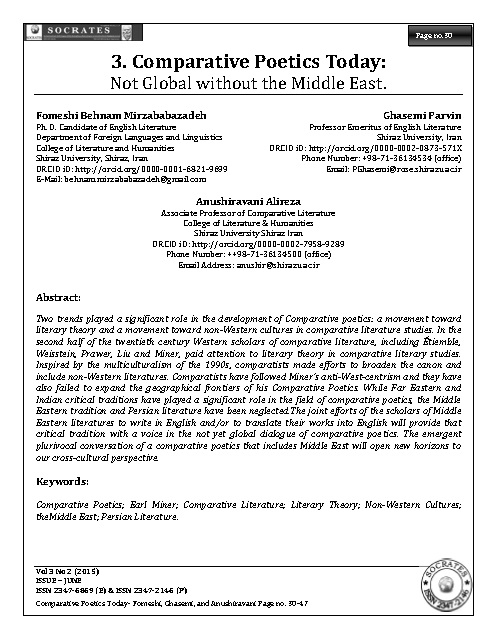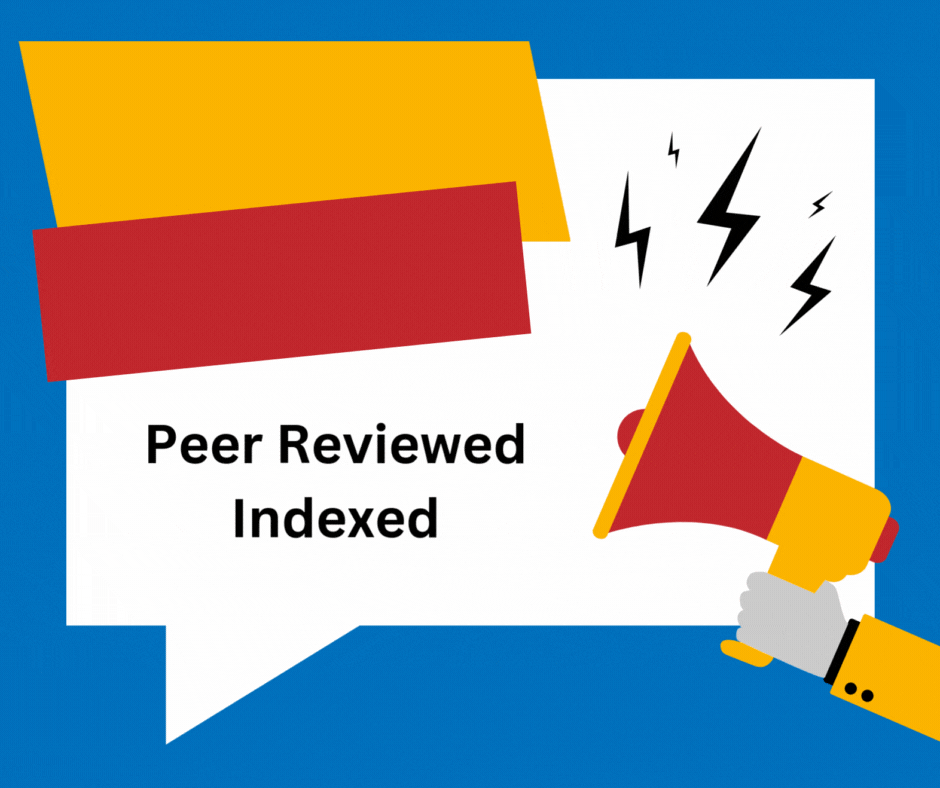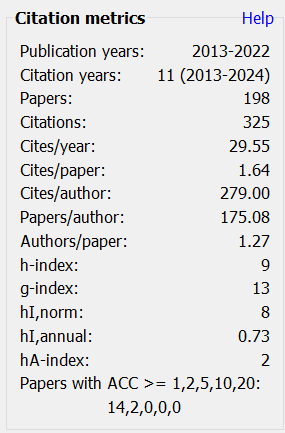Comparative Poetics Today
Not Global without the Middle East
Keywords:
Comparative Poetics, Earl Miner, Comparative Literature, Literary Theory, Non-Western Cultures, theMiddle East, Persian LiteratureAbstract
Two trends played a significant role in the development of Comparative poetics: a movement toward literary theory and a movement toward non-Western cultures in comparative literature studies. In the second half of the twentieth century Western scholars of comparative literature, including Étiemble, Weisstein, Prawer, Liu and Miner, paid attention to literary theory in comparative literary studies. Inspired by the multiculturalism of the 1990s, comparatists made efforts to broaden the canon and include non-Western literatures. Comparatists have followed Miner’s anti-West-centrism and they have also failed to expand the geographical frontiers of his Comparative Poetics. While Far Eastern and Indian critical traditions have played a significant role in the field of comparative poetics, the Middle Eastern tradition and Persian literature have been neglected.The joint efforts of the scholars of Middle Eastern literatures to write in English and/or to translate their works into English will provide that critical tradition with a voice in the not yet global dialogue of comparative poetics. The emergent plurivocal conversation of a comparative poetics that includes Middle East will open new horizons to our cross-cultural perspective.
Downloads
Metrics
References
André, J. (2003). “Whither East-West Comparative Literature? Two Recent Answers from the U.S.” Bulletin of the Institute of Chinese Literature and Philosophy, Academia Sinica. 22: 291-302.
Anushiravani, A. (2011). “World Literature: from Idea to Theory.” Comparative Literature Journal of the Academy of Persian Language and Literature. 2. 1: 23-41.
Apter, E. (2006). The Translation Zone: A New Comparative Literature. Princeton: Princeton University Press.
Bassnett, S. (1993). Comparative Literature: A Critical Introduction. Oxford UK: Blackwell Publishers.
Bassnett, S. (2006). “Reflections on Comparative Literature in the Twenty-First Century.” Comparative Critical Studies. 3. 1-2: 3-11.
Bernheimer, C. (1995). Comparative Literature in the Age of Multiculturalism. Baltimore: The Johns Hopkins UP.
Bertocci, A. P., et al. (1963). “Graduate Study in Comparative Literature: A Symposium.” Comparative Literature Studies. Special Advance Number: 135-142.
Cai, Z. (2002). Configurations of Comparative Poetics: Three Perspectives on Western and Chinese Literary Criticism. Honolulu: University of Hawaii Press.
Cao. S. (2013). The Variation Theory of Comparative Literature. New York: Springer Heidelberg.
Coomaraswamy, A. K. (1934). The Transformation of Nature in Art. Cambridge: Harvard University Press.
Coomaraswamy, A. K. (1956). Christian and Oriental Philosophy of Art. New York: Dover Publications.
Culler, J. D. (2006). “Whither Comparative Literature.” Comparative Critical Studies. 3. 1–2. 85–97.
Damrosch, D. (2003). What Is World Literature? Princeton and Oxford: Princeton University Press.
Damrosch, D. (2008). “Toward a History of World Literature.” New Literary History. 39: 481–495.
Damrosch, D. (2014). World Literature in Theory. New York: Wiley-Blackwell.
D'haen, T. (2013). The Routledge Concise History of World Literature. London & New York: Taylor & Francis
During. S. (2004). “Comparative Literature.” ELH. 71: 313-322.
Eoyang, E. C. (1993). The Transparent Eye Reflections on Translation, Chinese Literature, and Comparative Poetics. SHAPS library of translations, Honolulu: University of Hawaii Press.
Etiemble, R. (1966). The Crisis in Comparative Literature. Trans. Herbert Weisinger and Georges Joyaux. East Lansing: Mich.
Fokkema, D. W. (1987). Issues in General and Comparative Literature. Calcutta: Papyrus.
Fokkema, D. W. (2007). “World literature”. Encyclopedia of Globalization. Eds. R. Robertson and J. A. Scholte. New York: Routledge.
Fokkema, D. W. (2011). Perfect Worlds: Utopian Fiction in China and the West. Amsterdam: Amsterdam University Press.
Fokkema, D. W. (2013). “Foreword.” The Variation Theory of Comparative Literature. New York: Springer Heidelberg. v-vii.
Fokkema, D. W., Elrud Kunne-Ibsch and A. J. A. van Zoest. (1975). Comparative Poetics. Amsterdam: Rodopi.
Gáfrik, R. (2009). “The Notion of World Literature and the Definition of Literature in Western and Indian Literary Studies.” World Literature Studies. 1.1: 28-42
Gáfrik, R. (2010). “Literary Theory and Reading World Literature in the Age of Multiculturalism.” Theories in Practice: Proceedings of the First International Conference on English and American Studies, September 9, 2009, Tomas Bata University in Zlín, Czech Republic. Zlín: Univerzita Tomáše Bati. 163-169.
Gáfrik, R. (2013). “World Literature and Comparative Poetics: Cultural Equality, Relativism, or Incommensurability?” World Literature Studies. 5.2: 64-76.
Guillén, C. (1993). The Challenge of Comparative Literature. Trans. Cola Franzen. Cambridge: Harvard University Press.
Hare, T. (2010). “Our Common Understanding, for Earl Miner.” Comparative Critical Studies. 7.2–3: 325–334.
Hogan, P. (2000). Philosophical Approaches to the Study of Literature. Gainesville: University Press of Florida.
Lefevere, A. (1995). “Introduction: Comparative Literature and Translation.” Comparative Literature. 47. 1: 1-10.
Liu, J. J. Y. (1962). The Art of Chinese Poetry. Chicago: University of Chicago Press.
Liu, J. J. Y. (1975). Chinese Theories of Literature. Chicago: University of Chicago Press.
Liu, J. J. Y. (1977). “Toward a Synthesis of Chinese and Western Theories of Literature.” Journal of Chinese Philosophy. 4: 1-24.
Maslov, B. (2008). “Comparative Literature and Revolution: or the Many Arts of (Mis)reading Alexander Veselovsky.” Compar(a)ison. 2: 101-129.
Miner, E. (1958). The Japanese Tradition in British and American literature. New Jersey: Princeton University Press.
Miner, E. (1987). “Some Theoretical and Methodological Topics for Comparative Literature.” Poetics Today. 8. 1: 123-140.
Miner, E. (1990). Comparative Poetics: An Intercultural Essay on Theories of Literature. New Jersey: Princeton University Press.
Moretti, F. (2000). “Conjectures on World Literature.” New Left Review. 1: 54–66.
Moretti, F. (2003). “More Conjectures.” New Left Review. 20: 73-81.
Moretti, F. (2005). Graphs, Maps, Trees: Abstract Models for Literary History. Afterword by Alberto Piazza. Verso: New York.
Mukherjee, T. (2013). “Comparative Literature and Ex-centricity.” Companion to Comparative Literature, World Literatures, and Comparative Cultural Studies. Eds. Steven Tötösy de Zepetnek and Tutun Mukherjee. New Delhi: Cambridge University Press India Pvt. Ltd. 36-58.
Palumbo-Liu, D. (2011). “Method and Congruity: The Odious Business of Comparative Literature.” A Companion to Comparative Literature. Ed. Ali Behdad and Dominic Thomas. Oxford: Blackwell Publishing Ltd.
Panda, H. (2000). “Literary Ontology in India and the West : A Study in Comparative Poetics.” Comparative Literature: Essays in Honour of Professor M.Q. Khan. Ed. Bijay Kumar Das. New Delhi: Atlantic Publishers and Distributers. 17-34.
Pizer, J. (2006). The Idea of World Literature: History and Pedagogical Practice. Baton Rouge: Louisiana State University Press.
Prawer, S. S. (1973). Comparative Literary Studies: An Introduction. London: Duckworth.
Spivak, G.C. (2003). Death of a Discipline. New York: Columbia University Press.
Stallknecht, N. P. and Horst Frenz. (1961). Comparative Literature: Method and Perspective. Carbondale: Southern Illinois University Press.
Thomsen, M. R. (2008). Mapping World Literature: International Canonization and Transnational Literatures. London: Continuum.
Tötösy de Zepetnek, S. (1999). "From Comparative Literature Today toward Comparative Cultural Studies" CLCWeb: Comparative Literature and Culture. 1.3: http://docs.lib.purdue.edu/clcweb/vol1/iss3/2
Ueda, M. (1993). “Comparative Poetics: An Intercultural Essay on Theories of Literature by Earl Miner.” Comparative Literature. 45.3 (1993): 287–288.
Villanueva, D. (2013). “Possibilities and Limits of Comparative Literature Today.” Companion to Comparative Literature, World Literatures, and Comparative Cultural Studies. Ed. Steven Totosy de Zepetnek and Tutun Mukherjee. New Delhi: Cambridge University Press India Pvt. Ltd. 49-62.
Wang, N. (2004). “Canon Formation, or Literary Revisionism: The Formation of Modern Chinese Literary Canon”. Neohelicon. 31: 161–174.
Wang, N. (2010). “World Literature and the Dynamic Function of Translation.” Modern Language Quarterly. 71. 1: 1-14.
Wang, N. (2011). “‘Weltliteratur’: From a Utopian Imagination to Diversified Forms of World Literatures.” Neohelicon. 38: 295–306.
Wang, N. (2012). “Translating Modernity and Reconstructing World Literature.” Minnesota Review. 79: 101- 112.
Wang, N. (2014). “Earl Miner: Comparative Poetics and the Construction of World Poetics.” Neohelicon 41:415–426.
Wang, X. and Yan Liu. (2011). "Comparative Literature in Chinese." CLCWeb: Comparative Literature and Culture. 13.4 http://dx.doi.org/10.7771/1481-4374.1882
Wellek, R. (1965). “Comparative Literature Today.” Comparative Literature. 17. 4: 325-337.
Wellek, R. (1968). "The Name and Nature of Comparative Literature." Comparatists at Work. Eds. Stephen G. Nicholls and Richard B. Vowles. Waltham, MA. 3-27.

Downloads
Published
How to Cite
Issue
Section
License
Revised Copyright/CC license that applies to all the articles published after 05-02-2017
Attribution-NonCommercial 4.0 International (CC BY-NC 4.0)

Copyright/CC license that applies to all the articles published before 05-02-2017
Attribution-Non Commercial-No Derivatives 4.0 International (CC BY-NC-ND 4.0)

Author(s) will retain all the right except commercial and re-publishing rights. In the case of re-publishing, they will have to obtain written permission from the journal. Additional licensing agreements (Creative Commons licenses) grants rights to readers to copy, distribute, display and perform the work as long as you give the original author(s) credit, they can not use the works for commercial purposes and are not allowed to alter, transform, or build upon the work. For any reuse or distribution, readers and users must make clear to others the license terms of this work. Any of these conditions can be waived if you get permission from the copyright holders. Nothing in this license impairs or restricts the authors’ rights. To view a copy of this license, visit http://creativecommons.org/licenses/by-nc-nd/4.0/ or send a letter to Creative Commons, 171 Second Street, Suite 300, San Francisco, California, 94105, USA.
Research Papers published in SOCRATES are licensed under an Attribution-NonCommercial-NoDerivatives 4.0 International (CC BY-NC-ND 4.0)












